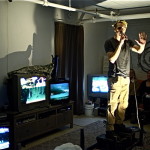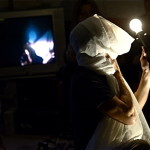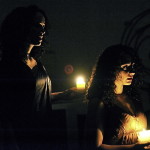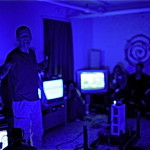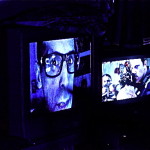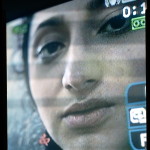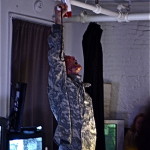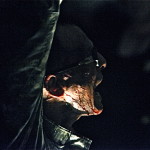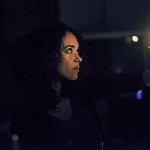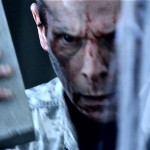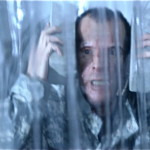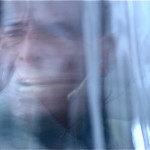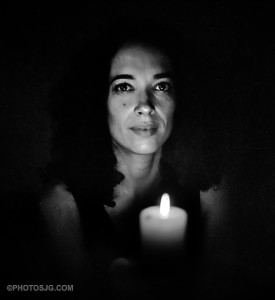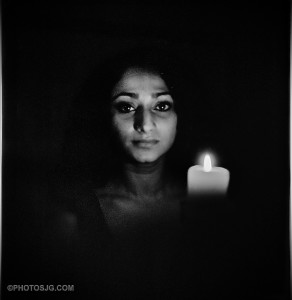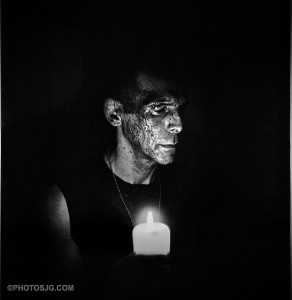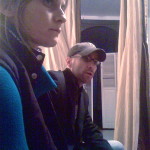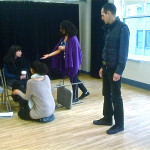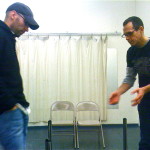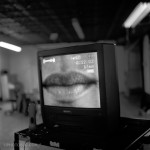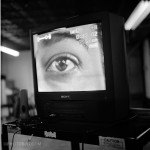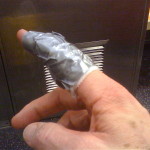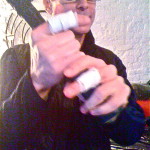Photos by Jason Goodman
Excerpts from the reviews
Full reviews are below
“As harrowing account of war as I have ever imagined . . . a conflation of the comfort of the living room and the violence of war . . . Of all the politically charged work I saw in Under The Radar, this one seemed to be the most disruptive and upending. It is partially a show, partially a ritual and exorcism and accusation. It marries all the technology of the moment to one of Western civilization’s oldest and starkest accounts of war to make the connection between past and present . . . All of the actors acquit themselves admirably, balancing intimacy and “acting”, finding just the right tones at the right moments to bring these difficult scenes to life . . . Smith transforms from new recruit to grizzled veteran before our eyes, slowly transforming from man to beast, from farmer to destroyer. It is an impressive performance . . . ” Andy Horwitz, Culturebot
Video
Excerpt from a scene where Patroclus appeals to Achilles to end the war.
Publicity
poster by The Hinge Collective
Photos by Jason Goodman
Above: Carmen Chaplin, Rasha Zamamiri, T. Ryder Smith
Rehearsals
Row 1: Chris McElroen and designer Tijana Bjelalac check out the apartment; same; rehearsing, Rasha and Carmen.
Row 2: Reheasing; Chris and T work out a challenge; Production assistant Danielle Petrizzo and SM Conrad Kluck.
Row 3: Professor William Mullen of Bard College recording a passage from Homer in Greek; rehearsing video; same.
Row 4: cut fingers after smashing cinderblocks in show; same; publicity shot.
Full reviews
Culturebot, Andy Horwitz – Sunday afternoon took us to LaMama to see the final performance of Living in Exile by Jon Lipsky, directed by Christopher McElroen and T. Ryder Smith. It was a disturbing and exciting show – very powerful, intimate and thought- provoking. The audience is ushered into an apartment (there are only 17 people at a time) where they are seated around a living room table and surrounded by TVs, each playing something different. The hostesses offer us food and wine, take our coats and make sure we’re comfortable. We are encouraged to keep our phones on and, in fact, production assistants come by and take our phone numbers. As the banalities play in sensory overload on the television screens, everyone’s phones ring and we pick them up to hear a voice reciting The Iliad in ancient Greek. That’s, essentially, where the actor Smith takes over – narrating the story of The Iliad, playing the parts alternately of Achilles and Patrocles. In his effort he is supported by two lovely and talented actresses – Carmen Chaplin and Rasha Zamamiri – playing conquered women/priestesses. All of the actors acquit themselves admirably, balancing intimacy and “acting”, finding just the right tones at the right moments to bring these difficult scenes to life. I admit, I’ve never read The Iliad (I know, I know) but what ensues in Living In Exile is as harrowing account of war as I have ever imagined. And not just any war but a brutal war of attrition that grinds on and on for ten years. (Much like America’s current wars). In close quarters we learn of the depredations of war, the brutality inflicted on the conquered by the invaders, we learn of futile resistance and sheer inhumanity. All of it acted out, symbolically and viscerally, in front of you. Smith as actor is literally bringing the war into your living room. He transforms from new recruit to grizzled veteran before our eyes, slowly transforming from man to beast, from farmer to destroyer. It is an impressive performance. The actresses are also a powerful presence. In one sequence Ms. Zamamiri says her lines in what seemed to be Arabic. This added not only a layer of contemporary relevance but also reinforced the clash of cultures and misunderstanding in the original text. It is a simple effect but beautiful and disarming nonetheless. It is unclear at times whether the two women are playing one character or multiple characters, their identities shift, as does T. Ryder Smith’s and overall it reinforces the sense of bewilderment, alienation and confusion of war. And all this is happening with the TV monitors silently and accusingly flickering in the background. We have been given video cameras and are videotaping the whole thing as it unfurls in front of us. The entire production is a conflation of the comfort of the living room and the violence of war and it definitely indicts us for our indifference and disengagement from the horrors our government is inflicting on others in our name. Or in the name of Democracy. Of all the politically charged work I saw in Under The Radar, this one seemed to be the most disruptive and upending. It is partially a show, partially a ritual and exorcism and accusation. It marries all the technology of the moment to one of Western civilization’s oldest and starkest accounts of war to make the connection between past and present, to reveal how little has changed and to challenge us, finally, to learn from our history and try to take action.Good stuff. Hopefully the show will come back in some form so more people can get a chance to see it. January, 2011
[previous] [next]

